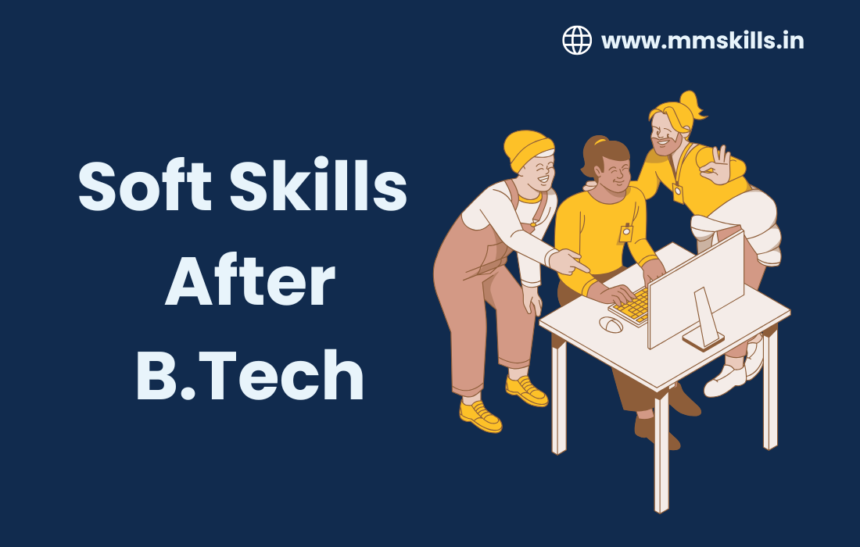In the fast-paced world of technology, B.Tech graduates usually stumble and lose their way. Yes, their skill and talent for coding is quite manifest, but it is not enough to win the race. So is the age of soft skills – the unseen heroes of professional success. This in-depth guide will tell you how your personality should blend with your technical qualifications, thus making you different from the others on a flooded job market.
The Soft Skills Revolution: More Than Just Technical Know-How

At present time, soft skills have been taken to another level. They directly pertain to personal traits that allow you to communicate properly, confidently observe group complications, and easily handle both your professional and personal lives. For B.Tech graduates, they are the missing link that connects theoretical knowledge with real-world scenarios.
In a recent survey by LinkedIn, 92% of hiring managers report that soft skills are just as or more critical than hard skills for making hiring decisions. This stat nicely illustrates the shift towards multifaceted IT experts who master not only coding but also clear communication, problem-solving, and leadership skills.
Key Soft Skills for B.Tech Graduates
1. Communication
Very important in every professional setting is effective communication. Being a B.Tech graduate, you need to talk about complicated technical things to the laymen, and express ideas clearly and coherently in reports and documentation.
Tip: You can regularly teach somebody who is not a tech person a technical stuff at an easier than usual level. This will be very beneficial for your ability to say much with little words.
2. Teamwork and Collaboration
Almost all tech projects are team-based. Moreover, the art of successful team effort is the ability to use listening and feedback skills as well as to work toward the success of the whole group. One of the things that should be part of it is to be open to the diversity of ideas, learn to live with different opinions and create an enjoyable atmosphere for the bunch.
Example: A report from Google’s Project Aristotle showed that the most successful teams are not those with the highest average IQ but the ones whose members have greater emotional intelligence and are good at collaboration.
3. Adaptability and Flexibility
Indeed, tech is rapidly changing, and thus the need arises for agile B.Tech graduates to be recruited. At the same time, one must be ready to master new technologies, adopt new methodologies, and work in different environments. During this period, one of the essential qualities to master is flexibility.
4. Problem-Solving and Critical Thinking
While programming is a domain where one uses their technical capabilities to resolve issues, the flairs of critical thinking are needed for successful resolution of complex business and operations problems. To solve a problem requires you to view it from different angles, make the right decisions, and find new solutions.
5. Emotional Intelligence
Emotional intelligence (EQ) deals with understanding, managing, and also influencing your own emotions, as well as the emotions of others. High EQ results in good teamwork, leadership, and client relationships.
Statistic: A research by TalentSmart established that 90% of top performers exhibit high emotional intelligence.
The Impact of Soft Skills on Career Progression
From Developer to Team Lead
The development from an entry-level developer to a team lead is also the progress from a mere role to a leadership role that, in fact, implies the need for soft skills. The job of a leader entails both the ability to motivate teams and to handle conflicts and should know effective ways of communication with the team members and the stakeholders as well.

Case Study: Sarah is an example of a B.Tech graduate who was remarkable in her coding skills but was still confined to the rank of senior developer. Her implicit focus on strengthening her communication and leadership skills did not leave the management indifferent. Consequently, just within a year, she got promoted to the line of team lead, which means that she was in charge of a group of 10 developers.
Client Interactions and Project Management
As you become responsible for larger projects with more deadlines, you will also be expected to interact with clients and be involved in the management of the projects. Soft skills are paramount for client understanding, managing their expectations and ensuring project advancement.
Tip: Jump into small projects or client presentations by helping those who lead such activities to develop gradually these abilities.
Innovation and Creativity
Soft skills such as creativity and out-of-the-box thinking are most important for the process of innovation. They allow you to look at problems from a different perspective and hence to generate alternative solutions which make you stand out in your practice field.
Developing Soft Skills: A Practical Guide
1. Self-Assessment
Start by being honest and assess your current soft skill level. Find the areas where you are confident and those where you need to improve. For a more critical and unbiased view, ask your colleagues, mentors, or supervisors to give you feedback.
2. Continuous Learning
See soft skills in the same light as you see technical skills. Anyway, if you feel that attending workshops reading books or taking online communication and leadership or even personal intelligence courses can help you, do not hesitate to take advantage of such opportunities.
Resource: Websites like Coursera and edX have specialized courses about soft skills development for tech people which you might find beneficial to you.
3. Practice and Application
Seek out these opportunities in your daily work. Volunteer for presentations, be in cooperation with cross-functional teams, or train new comers.
4. Seek Feedback and Reflect
On a regular basis, ask for comments on the performance of your soft skills. At the same time, reflect on your interaction with others and your experiences and think about the areas for improvement.
5. Networking and Professional Associations
Join professional associations or clubs with people from your profession. In addition to that, these places will help you to develop social skills and to learn from the experiences of others.
The Competitive Edge: How Soft Skills Set You Apart
Nowadays, in a labor market where too many B.Tech graduates are merely experts in tech, soft skills could be your main advantage. They serve as proof of your abilities not only to just carry out the technical tasks, but besides that to show your skills in real-life situations.
Statistic: The National Association of Colleges and Employers conducted a study also underscoring the importance of soft skills as the ones that had top ratings by the graduates’ employers for example among the problem-solving and teamwork skills.
During Job Searches
Add your soft skills in your resume and cover letter. Attend interviews and then guide them using the examples of work and life situations where you have shown your soft skills (communication, human dimensions, situational flexibility etc).
In Performance Reviews
Nowadays, many companies are also using their soft skills tests for the performance review of their individuals. Employees with strong soft skills are more likely to get a higher performance rating and come across quicker promotions.
Balancing Technical and Soft Skills: The Perfect Blend
A successful partnership in career terms means the right combination of diligence in defining and developing, on one hand, one’s technical expertise and on the other, the proper soft skills set. The technical aspect gets a person it the door while his behavior and attitude give him the chances to more quickly adapt, grow, and make a difference inside the company.
Expert Insight: “In my professional life, where my major job is the recruitment and managing of tech teams, I have to say that the most productive staff members are those who can bring their computer knowledge into a close relationship with their sociability,” remarks Rajesh Kumar, CTO of a leading tech firm.
The T-Shaped Professional
Try to be a T-shaped professional: be the master of a specific technology or functional area and be an all-encompassing team player at the same time.
Real-World Success Stories
The Communicator-Coder
Priya was a Computer Science B.Tech graduate, she was known for her excellent coding skills. To many, she was the go-to person in the technical field. However, it was the way she could repeat the whole process of complex technical concepts to the non-technical people that got her management to notice her. This skill led to her promotion as a diplomat of her clients, a functioning connection between technical teams and clients.

The Adaptable Engineer
Rahul, a mechanical engineer by training, rose from the bottom to the top of the industry he now operates in. He was so adaptable and learned to change with the times that he proved to be a valuable team member throughout his professional journey. Besides this, now as a team manager, he equips diverse teams with the latest technologies and innovations to design cutting-edge products.
The Soft Skills Advantage

For a B.Tech graduate, though, your tech skills are the foundation, your soft skills are, in fact, the cementing elements of a successful career. By strengthening and enhancing these essential skills, you will position yourself not just as a person who can get the job done in a professional setting but as a whole professional who can also lead management and innovation as well.
Remember, not only knowing something but also your skilful communication and application of this knowledge is the key to become successful amid the ever-advancing field of technology. Live and preach about the power of these soft skills in the career of technology and see these doors open to great opportunities and growth in your career path.
When you are focused on your professional development, you will inevitably acquire better technical skills. However, do not forget about the softer part of your professional development. With your two-time approach, you will both accelerate your career and become a better person overall.






